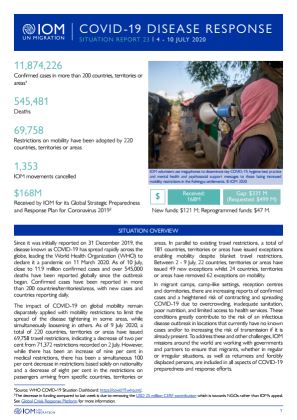-
Countries
-
Data and Analysis
-
Special Focus
-
Crisis Responses
IOM COVID 19 Response - Situation Report 23 (10 July 2020)

Contacto
COVID Response HQ - covid19ops@iom.int
Idioma
English
Ubicación
Global
Fecha de instantánea
Jul 04 2020
Jul 10 2020
Actividad
- Other
Since it was initially reported on 31 December 2019, the disease known as COVID-19 has spread rapidly across the globe, leading the World Health Organization (WHO) to declare it a pandemic on 11 March 2020. As of 10 July, close to 11.9 million confirmed cases and over 545,000 deaths have been reported globally since the outbreak began. Confirmed cases have been reported in more than 200 countries/territories/areas, with new cases and countries reporting daily.
The impact of COVID-19 on global mobility remain disparately applied with mobility restrictions to limit the spread of the disease tightening in some areas, while simultaneously loosening in others. As of 9 July 2020, a total of 220 countries, territories or areas have issued 69,758 travel restrictions, indicating a decrease of two per cent from 71,372 restrictions recorded on 2 July. However, while there has been an increase of nine per cent in medical restrictions, there has been a simultaneous 100 per cent decrease in restrictions based solely on nationality and a decrease of eight per cent in the restrictions on passengers arriving from specific countries, territories or areas. In parallel to existing travel restrictions, a total of 181 countries, territories or areas have issued exceptions enabling mobility despite blanket travel restrictions. Between 2 - 9 July, 22 countries, territories or areas have issued 49 new exceptions whilst 24 countries, territories or areas have removed 62 exceptions on mobility.
In migrant camps, camp-like settings, reception centres and dormitories, there are increasing reports of confirmed cases and a heightened risk of contracting and spreading COVID-19 due to overcrowding, inadequate sanitation, poor nutrition, and limited access to health services. These conditions greatly contribute to the risk of an infectious disease outbreak in locations that currently have no known cases and/or to increasing the risk of transmission if it is already present. To address these and other challenges, IOM missions around the world are working with governments and partners to ensure that migrants, whether in regular or irregular situations, as well as returnees and forcibly displaced persons, are included in all aspects of COVID-19
preparedness and response efforts.
